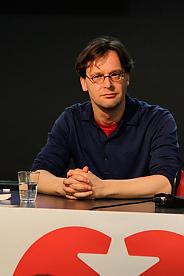How the Netherlands made it possible to create the ‘Islamic’ nuclear bomb
How the Netherlands made it possible to create the ‘Islamic’ nuclear bomb
Ronald van Raak: “I want rehabilitation for whistleblower Frits Veerman”
 The Dutch government refused to intervene when in the 1970s nuclear spy Abdul Quadir Khan came to our country to steal nuclear information. Worse still, ministers deliberately allowed this spy to do his work for Urenco in the town of Almelo, specializing in uranium enrichment. It was in part the information collected by Kahn on the ultracentrifuge that made it possible for Pakistan to develop an atomic bomb. The necessary knowledge was later sold by Khan to Libya and Iran - even to North Korea, countries where even then extremists with a deep hatred of the West were in power. These are countries that will be willing to distribute this atomic information to who knows what jihadist factions.
The Dutch government refused to intervene when in the 1970s nuclear spy Abdul Quadir Khan came to our country to steal nuclear information. Worse still, ministers deliberately allowed this spy to do his work for Urenco in the town of Almelo, specializing in uranium enrichment. It was in part the information collected by Kahn on the ultracentrifuge that made it possible for Pakistan to develop an atomic bomb. The necessary knowledge was later sold by Khan to Libya and Iran - even to North Korea, countries where even then extremists with a deep hatred of the West were in power. These are countries that will be willing to distribute this atomic information to who knows what jihadist factions.
The whistleblower in prison
It is forty years since Frits Veerman, former employee of Abdul Khan, informed the Dutch Secret Service, known at the time as the BVD, that his boss was spying for Pakistan. The BVD was, however, already aware of Khan's activities, but had received a request from the CIA not to intervene. That was the explanation given by former Prime Minister Ruud Lubbers in 2005 on Argos, a programme of investigative journalism broadcast by the public channel VPRO. In the years since, Argos has paid frequent attention to the matter.
It was, however, not the Pakistani atomic spy, but the Dutch whistleblower who was incriminated. Frits Veerman, attached to the technical consultancy FDO (VMF-Stork) in Amsterdam, was arrested and taken to the Bijlmerbajes prison in Amsterdam, where he was interrogated for three days. "Everybody told me I was crazy,” he says. “I felt helpless and small." Veerman could certainly provide proof of the truth of his allegations. “I was told to burn the letters.,” he says. “I was told to shut my mouth. I refused."
The atomic spy released
Despite this, in 1979, the case came once more under the spotlight, when the German TV channel ZDF revealed that Abdul Khan at Urenco, a company operating in the Netherlands, Germany and Britain, was looking for information vital to the building of a nuclear bomb. This revelation forced the Netherlands to open a criminal investigation, which in 1983 resulted in Khan being sentenced to four years in prison. The verdict, however, was reversed on appeal because of a technicality in the earlier trial. A retrial would have been the logical thing to do, but it never happened. Khan was unconditionally freed. The Dutch government also allowed Dutch companies, including Philips, Stork and Van Doorne's Transmission - which even produced tubes for the centrifuge – to supply special equipment to Pakistan. This was mostly the work of Dutch merchant Henk Slebos. Slebos’ activities were monitored by the secret service, but never obstructed in any way.
Historical baggage
"I've always carried this as a heavy burden," former government minister Ed van Thijn told the national daily De Volkskrant in 2011. "It would be an unbearable thought that the Netherlands had been the source of the proliferation of nuclear weapons in the world, even to the most precarious countries. That would be quite some historical baggage." One is left to guess why the United States (along with Britain) requested our cooperation in such a huge spy scandal. Possibly because India had an atom bomb already, and had had help from the Russians, we now had to help the politically unstable and radical Muslim Pakistan to a acquire the same weapon. They were provided with knowledge that the country has subsequently shared with other Islamic countries, including Iran, which remains a nuclear threat, and even with Stalinist North Korea, which has been a nuclear threat for many years.
Rehabilitation for whistleblower Frits Veerman
It is forty years since Frits Veerman came forward, and the whistle-blower is still experiencing the adverse effects on a daily basis. He lost his job and saw his social life ruined. Frits Veerman did his civic duty, but was then intimidated and destroyed by the Dutch government. Earlier this month the Whistleblowers' Centre was founded in the Netherlands. I would like to ask the Centre whether it is prepared to do a report on how Frits Veerman has been treated by the authorities. It is also time to be clear as to why the secret services in our country allowed nuclear spy Abdul Khan to go free and to reveal just what has been the influence of the CIA in the affair. In my view this is a task for the Commission for Supervision of Intelligence and Security (CTIVD), the official auditor that has access to all the data gathered by the Dutch secret service, the AIVD. This atom scandal is far too large to be hidden forever.
